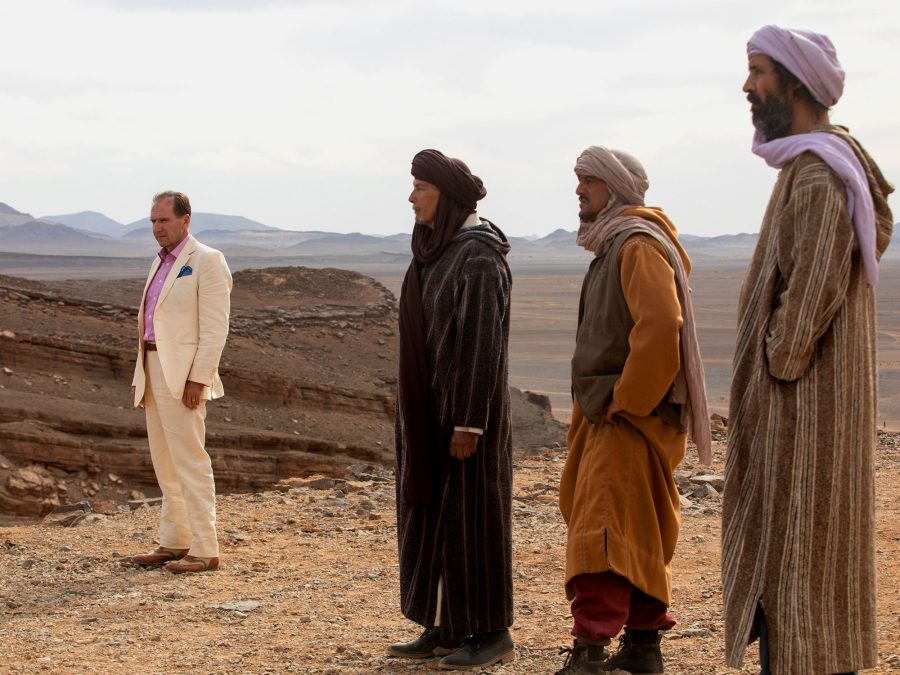Jessica Chastain and Ralph Fiennes are unhappily married in John Michael McDonagh's uninspired culture clash drama.
A logical point of comparison for John Michael McDonagh’s The Forgiven is Babel, Alejandro González Iñárritu’s sweeping 2006 narrative of interwoven stories. While this sticks to one country, and is less ambitious in its scope, the dramatic catalysts in both films concern tragic accidents involving white tourists and local young men colliding in the deserts Moroccan.
Babel is a film which focuses on concepts of miscommunication and globalisation, while The Forgiven’s thematic meat is instead the recklessness of the condescending rich, alongside Western influence on the Arab world. All with writer-director McDonagh’s trademark provocative and caustic humour – previously seen in The Guard, Calvary and War on Everyone – bolted on to inconsistent effect.
The film sees Coriolanus co-stars Ralph Fiennes and Jessica Chastain play husband and wife once more, with Fiennes again playing an anus. They’re invited to the desert villa of old friend Richard (Matt Smith) and his partner Dally (Caleb Landry Jones) for a weekend celebration near the High Atlas Mountains. Driving to the remote abode at night, Fiennes’ alcoholic David hits and kills impoverished teenager Driss (Omar Ghazaoui) while under the influence.
Chastain’s Jo initially descends into a state of shock, while David is more concerned with consequences than being remorseful for having killed someone. While Richard and Dally at first express seemingly genuine horror at the sight of the body brought to their place, matters quickly turn to pragmatism and getting festivities back on track.

Following a police report, Driss’ father, Abdellah (Ismael Kanater), later arrives at the estate, insisting David accompany him and English-speaking associate Anouar (Saïd Taghmaoui) back to their village for a burial. Richard and company practically have to force David into the villagers’ van to make amends, the bigoted man convinced he’s either about to lose thousands in a pay-off or be kidnapped by “fucking ISIS”.
Here, the narrative splits. Following David in one strand, we get a familiar tale of a privileged individual gradually learning a lesson from the sacrifice of someone disadvantaged. Considering McDonagh’s previous writing form, you’re left expecting some subversion or commentary on this overused device – but it never comes. That this section works at all is testament to Fiennes’ ability to inject depth into a relatively one-note character, and the ever-reliable Taghmaoui, with whom he forms a bond, also delivers the dramatic goods. Back at the party, Jo enjoys freedom from her terrible husband, embracing the advances of Christopher Abbott’s Tom.
But McDonagh gives the rest of the talented cast precious little to do. Marie-Josée Croze’s sanctimonious photojournalist proves inconsequential. Alex Jennings’ lord is introduced with hype upon his late arrival, only to contribute very little to proceedings. And poor Abbey Lee – so great an ensemble player in Mad Max: Fury Road and Old – is here a glorified extra despite high billing, saddled with a dialogue-light party girl stereotype. And an oral punchline, in that she exits the film offering someone a blowjob for a ride to Casablanca.
Little White Lies is committed to championing great movies and the talented people who make them.
Published 31 Aug 2022
John Michael McDonagh returns with… Babel, but funny(-ish)?
The question of how this messy situation will be resolved means it’s never dull.
Too muted and thinly written for its acerbic bite to really make a mark.